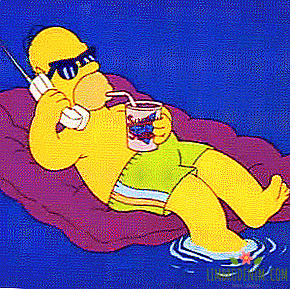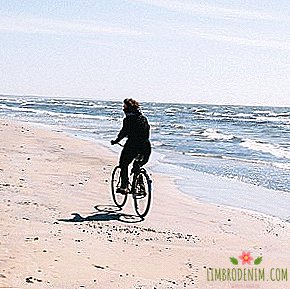Actress Alexandra Cherkasova-Servant about favorite books
IN BACKGROUND "BOOK SHELF"we ask journalists, writers, scholars, curators, and other heroines about their literary preferences and publications, which occupy an important place in their bookcase. Today, actress Alexandra Cherkasova Servant shares her stories about favorite books.

 I vividly remember my first appearance on the stage - it was on the stage of the House of Scientists in the New Year, when I was seven years old. I remember my jitters before and after ecstasy. My parents took me to a cafe on Arbat, and I crookedly and inertly tried to explain to my dad what powerful charge I received from the audience, to which he replied: "That's why they become actors." My fate was already decided then. I didn’t want to be anyone else, and I didn’t imagine myself in the future.
I vividly remember my first appearance on the stage - it was on the stage of the House of Scientists in the New Year, when I was seven years old. I remember my jitters before and after ecstasy. My parents took me to a cafe on Arbat, and I crookedly and inertly tried to explain to my dad what powerful charge I received from the audience, to which he replied: "That's why they become actors." My fate was already decided then. I didn’t want to be anyone else, and I didn’t imagine myself in the future.
Everyone in my family reads. Books came into my life so organically that I do not even remember when I read the first one. At the same time, it always seemed to me that I was not reading enough compared to my parents. Mom all the time rereads the stories of Chekhov and Leo Tolstoy, and dad specializes more in historical novels. By profession, they are diplomats, and my mother is also a teacher of the French language and still remembers by heart a lot of works. When I was still working in the Vakhtangov Theater, there was an urgent entry in the play "Eugene Onegin" (when the main artist for one reason or another cannot play, they "enter" another), and my mother telephoned Pushkin's text (it was a small monologue) in french. And all this from memory!
When I was a teenager, I thought that I definitely needed to “finish off” the book, whether you like it or not. Now I quit reading, if I'm not interested - just sorry to waste time. Leave, do not read, looking further. A book becomes important when it falls into your inner rhythm, when it coincides with what you are currently living. Therefore, there is nothing strange that one book occupied a huge place at twenty years old and completely ceased to be important at twenty-five.
Most of all I was changed, probably, by the Brothers Karamazov. Or maybe it coincided with the first and second courses of GITIS, when you emotionally and spiritually open up, and the directors and teachers do everything for this. Then I reread the Karamazovs two more times. That sharpness, probably, was no longer there, but, reading again, I remembered much about myself and compared this with myself. I remember how we spent the nights with a classmate in a cafe opposite Lenkom, drank double espresso, smoked a lot (in the cafe then you could still do it), talked about the meaning of life and what God means to everyone. Dostoevsky pushed me on these reflections - not only the Karamazovs, but also the Possessed, of course. I remember when I came to the temple in a few months and felt how the children's faith had broken in me. It happened exactly after reading. It took me a long time to build a new relationship with faith.
If you are an actor, you have to read a lot - this is an axiom. At least all the classics - Russian and foreign. Literature is taught in theater schools and the history of art and theater is an essential base. Pictures help me a lot: a couple of weeks ago I returned from Berlin, I was just shocked by the Berlin Art Gallery. Buddhists say that in order to be reborn, your experience in this life must be very many-sided. Maybe that's why artists so early and die.
Work in the theater is always built around a literary source. If I now work on Chekhov, then I read everything about this epoch - the books of Rayfield, Alevtina Kuzicheva, I watch movies on it. Rayfield's research is a wonderful book that shows Anton Pavlovich a living person who loves women (and who has a lot of them), and not a thoughtful, shy playwright in pince-nez. In fiction, I do not share the word and philosophy at all. The word "big" author is always equal to its content. For me, the sample in this is Chekhov. In general, I came to the conclusion that in books now I value wit and simplicity most of all.

Alice Koonen
"Pages of Life"
I really love autobiography. At some point I simply became ill with the aesthetics of the Tairov Theater, and Koonen was my inspiration. Judging by how well she wrote, there is no doubt that she was an amazing actress. Alisa Koonen became one of the youngest students of Stanislavsky: she came to his studio when Knipper-Chekhova was already playing on the theater stage.
Almost immediately, Koonen began to take many roles in the Moscow Art Theater, but also because of the desire to do something more, and perhaps because of the affair with the actor Kachalov, she left the theater. Later she met the director Alexander Tairov and became his muse for life. Together they created the Chamber Theater, where Koonen played Phaedra, Juliet, Cleopatra, Salome, Katerina Izmailova. Unfortunately, there are no videos of Alice Koonen’s game left - only photos, diaries and autobiography. This is one of my favorite books, through which you see a hot actor's heart.
Erich Maria Remarque
"Triumphal Arch"
I think that it was from the “Triumphal Arch” and the correspondence of Remark with Dietrich that my passion for the pre-war era began: his heroes of the “lost generation” still determine my taste - in music, in clothes, in everything. There is in all this unspoken longing, passion and languor.
Erich Maria Remarque - I remember this name and smile. I began to rehearse a passage from the Arc de Triomphe in the second year - and it began. For the first time in my life I tried Calvados. Mom took me to Jean-Jacques with the words: “How can you rehearse Remarque and not drink Calvados?” It was the first time I tried to smoke - I played Joan Madou, the prototype of which was Marlene Dietrich. "You will never feel Joan if you do not really smoke!" - My teacher told me. I only bought Gauloises and was terribly proud of it. At night I listened to the recordings of Marlene’s voice: it's nice that he is also very low with her! And then I found a book of their letters to each other, or rather those that remained, which Remarque’s wife did not burn from jealousy.
Ernest Hemingway
"Garden of Eden"
This is the last novel of Hemingway, the author did not have time to finish it. Wife restored the book on the entries in the diaries. For me, this is a very hot modern piece about a love triangle between two women and a man. I added the novel to the "Bookshelf," because for me it is also a kind of autobiography of Hemingway. The writer shows how misunderstanding and the pursuit of sex lead to the loss of the most important thing in a relationship and a bitter break.
Joanne Rowling
"Harry Potter"
This is my childhood love. Parents did not allow me to "Harry Potter" in Russian, and so I learned English. Only in the sixth book I read everything in Russian and was upset with the translation. I love how the plot complexity grows with the characters. In my opinion, the power of "Harry Potter" in its routine and understandable to every teenager problems in the development of his own "I." And all this against the backdrop of the magical world, where everything is simply divided into good and evil. I love the most boring fifth book, when the hero becomes a real hairy teenager, offended by the whole world and his friends.
John fowles
"Collector"
In the fourth year of GITIS, the director wrote to me and offered to play a short film - the film adaptation of "The Collector". Before, I read only Magus and decided that I would first read the work - and if I liked it, I would come to act. The meeting was supposed to be on Friday, and only on Thursday evening I was able to buy a book. And then it began! Until seven in the morning on Fridays, I read avidly — I didn’t sleep for a second, so I went to the tests. "Collector" is very thin, but for actors it is a godsend. The text of the novel is much more difficult to play and adapt to the script, but it is also more interesting: it makes the fantasy work at full capacity. Everyone was so immersed in the novel that I began to be afraid to walk in the parks at night and constantly felt that I was being followed, and the actor who played the main role, after the shooting went to the hospital.
series "ЖЗЛ"
"Elizabeth Tudor", "Marlene Dietrich", "Sarah Bernard"
I love to read biographies, especially women. These three are my favorites. They are ideal to take with you on the road, plus the size of the books allows you to take several pieces at once - I still read on paper. In all biographies, truthfulness is important - when a person (and often, for example, autobiographies are written as a certain result of life) begins to edit events or his reactions, it is very much felt. But the authors of “ZHZL” have the right to some fiction - the main thing is that the author still tells first about the person, and not about himself. The book about Elizabeth Tudor, for example, is full of beautiful quotes: "The world is strange: he is more likely to recognize a woman who has two lovers and killed her husband, a model of moral perfection than to forgive the other for her excessive independence and dissimilarity to others."
Anatoly Rybakov
"Children of the Arbat"
“Children of Arbat” strongly responded in me, because the story of the main characters echoes the story of my family. My great-grandfather, Jan Yanovich Musperts was a Latvian rifleman, who after the Revolution remained in Moscow and worked as an editor of the newspaper Izvestia. My grandfather, Yuri Yanovich, was born in 1927, his younger sister Berta was born in 1930. We still have a clipping from the newspaper: "At the congress, the always gloomy and haughty comrade Mushperts smiled at the joke of a comrade ...". In 1937, the great-grandfather started hunting: with the whole family they had to flee to Novosibirsk, and when everything calmed down (as they then thought) they returned to their native Arbat - the house where the Voentorg was located in Soviet times.
For the great-grandfather very quickly came the black "funnels". Father’s grandfather never saw it again. She and her mother had worn gears for another year and a half, and since they now opened the "Stalinist lists," it turned out that Yana was shot four months after the arrest. He was buried in a mass grave in Donskoy cemetery. Happiness that grandfather did not get to the orphanage, but stayed with his family. True, due to the fact that he was "the son of an enemy of the people," he could not go anywhere except in the Institute of Physical Education. But despite such a family history, the grandfather became one of the first jazz players in Moscow and Riga and a real dandy. If it were not for my grandfather, I would never have dared to enter a theatrical institution of higher education — I owe him everything: my character, my appearance, and my sense of humor.
Evgeny Vodolazkin
"Aviator"
The latest book, the most recent. There could be any of his works, I advise absolutely everything. This book is interesting combination of the nineties and the same thirties: a little fantasy, a little diary. Yevgeny Vodolazkina I like his lightness and invention, and the simplicity with which he talks about serious things.
Konstantin Stanislavsky
"My life in art"
This is the first book I bought when I first entered preparatory courses for the acting department. I didn’t understand anything in it especially and read it as entertaining stories. These are stories, but with examples of exercises and directions for the actor. Stanislavsky paid a lot of attention to his body and voice, and even wanted to write about the influence of yoga on the actor, but he did not have time - a pity: then we would practice yoga at GITIS not necessarily, but necessarily. In addition to “My life in art,” you should definitely read the recordings of the great actor Mikhail Chekhov, the nephew of Anton Pavlovich, who went to America and founded his famous school.
Mahatma Gandhi
"My life"
Easy book with a difficult context. Gandhi's story is full of unique details of everyday life in India: he writes about the beginning of his journey, his development as a politician, and public relations in India. This is the story of the first person of a unique person, a politician-yoga, which is born every few hundred years. I am convinced that some of the things that Gandhi writes about must at least try to sometimes be used in our lives, and it is better to practice them regularly.




